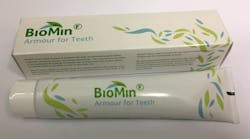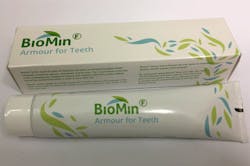BioMin Technologies commercializes remineralizing toothpaste technology developed by British researchers
BioMinF features a new remineralizing toothpaste technology designed to prevent tooth decay and sensitivity. Toothpastes containing the patented BioMinF technology slowly release calcium, phosphate, and fluoride ions over an 8- to 12-hour timeframe to form fluorapatite and rebuild, strengthen, and protect tooth structure.
"Using remineralizing toothpaste makes teeth far more resistant to attack from acidic soft drinks like fruit juices and sodas," said Professor Robert Hill, BSc, MsC, PhD, DIC, the chair of dental physical sciences at Queen Mary, University of London, who led the team that developed BioMin and won the 2013 Armourers and Brasiers Materials Science Venture Prize. "It is also much more effective than conventional toothpastes where the active ingredients, such as soluble fluoride, are washed away and become ineffective less than two hours after brushing."
"The technology behind BioMin is not, however, exclusively designed for toothpastes," added Hill. "It can also be incorporated in other professionally applied dental products, such as cleaning and polishing pastes, varnishes, and remineralizing filling materials."
Hill cofounded BioMin Technologies, which aims to commercialize the development. The company will be led by CEO Richard Whatley, who has 30 years of international management experience working for dental companies, including Dentsply and KaVo.
"We are very excited by the prospects of developing the patented technology, which has been licensed from Queen Mary University of London and Imperial College," said Whatley. "We are in the process of establishing licensing agreements with toothpaste and dental materials manufacturers around the world. A key element of our business model includes business partners also becoming investor stakeholders in the company, thus reducing the need for traditional third-party financing from venture capitalists. Our aim is for the BioMin brand to become synonymous [with] the treatment of tooth sensitivity in the eyes of both the dental profession and the general public."
"Tooth sensitivity is caused by open tubules in the teeth allowing access to the nerve receptors which may affect the quality of life of individuals particularly when eating and drinking hot and cold food and drink," said David Gillam, BA, BDS, MSc, DDS, FRSPH, FHEA, an expert in the management of dentinal hypersensitivity and a BioMin consultant and cofounder. "BioMin-containing toothpastes are effective [because they seal] the tubules with acid-resistant fluorapatite, which act as a barrier to hot and cold being transmitted inside the tooth."
Currently available to dentists online and via dental distributors, the BioMinF remineralizing toothpaste is expected to be made widely available to consumers by the end of the year. A fluoride-free version of BioMin is also being developed.
For more information, visit biomin.co.uk.







